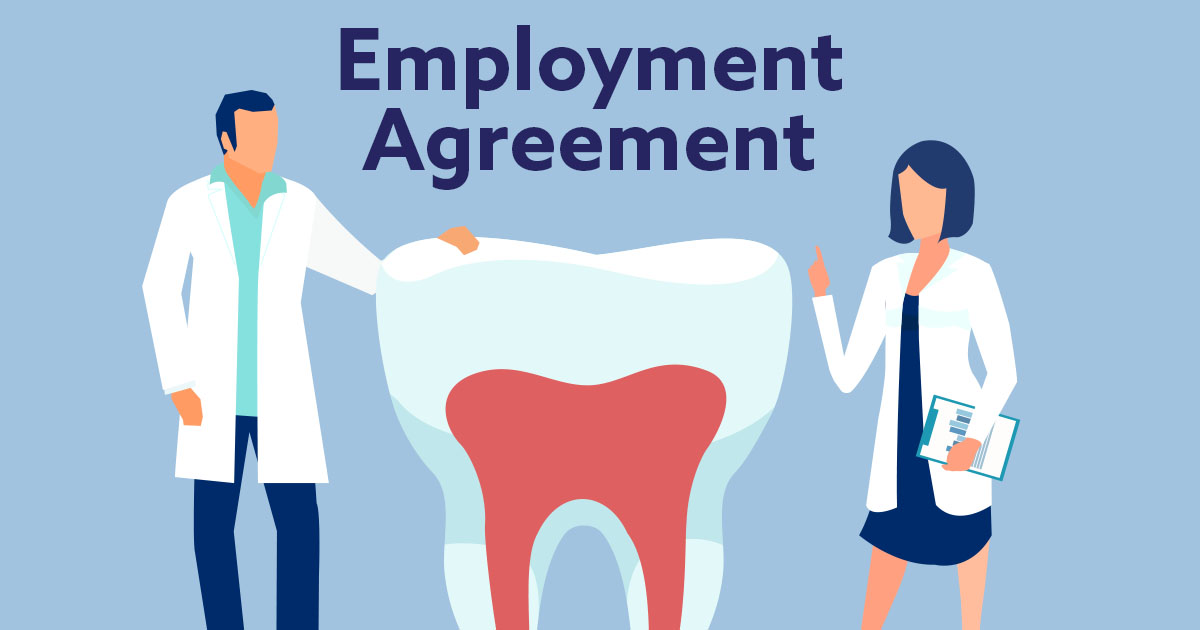Contracts, and the negotiations that surround them, are a significant part of the dental transition process. The most common contracts include the asset purchase agreement, real estate lease or sale agreement, and employment contract. Having the right team in place is essential to navigating this area successfully.
The most common contracts include the asset purchase agreement, real estate lease or sale agreement, and employment contract. Having the right team in place is essential to navigating this area successfully.
The asset purchase agreement (APA) is the main contract that outlines all the details of the purchase of the dental practice. Many brokers and attorneys have a template, but unlike a real estate transaction, the APA is unique to every transition and must be tailored to each situation.
It can be upward of 30 or more pages when the various schedules and exhibits are included.
The APA can have several sections including but not limited to:
Information about the transaction.
Information about closing.
Representation and warranties.
Restrictive covenant.
Indemnification.
Termination.
General provisions.
Schedules and exhibits referenced within the main document itself.
Much of the information in the document is legal boilerplate. However, there are some important areas that the seller must be aware of.
One area is the allocation of the purchase price. Most of the price should typically be allocated to goodwill, with the remainder divided up between furniture and equipment, supplies, patient records, and the restrictive covenant. This often takes some negotiation between both parties, and it is important to have your CPA involved as well, especially when selling a C corp.
Real estate is always a component of a transaction, it just depends on whether the building will be purchased from the seller, leased from the seller, and then purchased at some time in the future, or leased from a 3rd party landlord.

Whereas lenders will typically loan a buyer 100 percent of the purchase price, purchasing real estate requires the traditional 20 percent down. Depending on the value of the real estate, it can be difficult for buyers to come up with that money at the same time they are purchasing the practice.
In those cases, they may want to negotiate a lease agreement with the seller for a period of time while they save money for the down payment. This is not an uncommon situation, especially with younger buyers who may still have quite a bit of school debt. Lenders will typically require the term of the lease to match the term of the loan.
One of the biggest challenges in a transition and negotiating this part of the deal is when a 3rd party landlord is involved, and the lease is not easily transferrable. If the seller leases space in a professional building or some other location, having a landlord can sometimes completely derail a deal if a new lease needs to be drafted. Reasons for this include but aren’t limited to:
In many practice transitions the seller will agree to stay on as an associate or employee for a period of time; 3 months, 6 months, sometimes longer. In those situations, an employment agreement (EA) will be drafted.

Because it is usually a short period of time that the seller will be staying on, and there are some relatively common standards when it comes to associate agreements in terms of pay and benefits, this is an area that may take some negotiation but is often not a dealbreaker. It is still important to have an attorney review to ensure that the seller is protected as an employee.
In some situations, the basic details such as compensation and length of employment are included in the APA, but the EA will spell out the specifics including but not limited to:
Negotiating these contracts can take weeks and sometimes months, depending on the complexity of the deal and the expertise of the advisors involved. Some ADS members are also attorneys, while some members who are not will recommend attorneys that they have worked with before who have detailed knowledge of what goes into these contracts.
It is important to have experts on your team that are very experienced with the dental industry to help you during this phase as it will save a lot of time, money, and frustration.
Contact your local ADS member today for more information about dental transitions and how they can assist you with either buying or selling a practice.
In 2017 Kevin joined his father at American Practice Consultants and became owner in 2023. Kevin has has assisted dentists with over fifty dental transitions, written articles for ADS Dental Transitions and serves on the ADS Marketing Committee. Kevin knows firsthand that practice transitions can be complicated, and the ins and outs of practice sales often exceed the dentist’s training. American Practice Consultants is qualified to help you with every step of the journey, including valuing your practice, marketing, negotiation, drafting contracts, arranging financing (often 100%), and planning for staff and patients through a practice transition.
LinkedIn | Facebook | Instagram